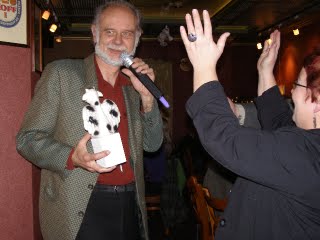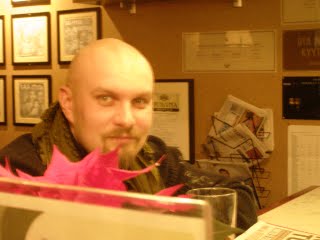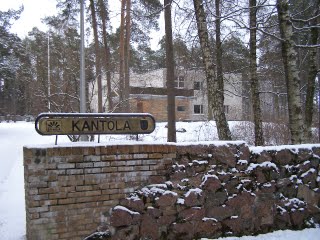Gothersgade 89 (ved siden af Cinemateket) i København.
50+ digtere fra hele landet har lovet at bidrage med et digt. Se den imponerende liste hér:
eDigtsamlinger og Sci-Fi-noveller rykker
Gothersgade 89 (ved siden af Cinemateket) i København.
50+ digtere fra hele landet har lovet at bidrage med et digt. Se den imponerende liste hér:
Kenneth: Sometimes I feel as if I am just the vessel, and you are the cargo.
Krabat: Even if that were true, which it is not, no cargo is delivered without a vehicle of transportation.
Kenneth: Uhm, what a nice day it is.
Krabat: What do you mean “nice”?! It’s a freaking AWESOME day! 23˚C and no rain! That’s GOOD!
Kenneth: Yeah, but you are not going out into the weather, are you? You are just going to sit in here and fiddle with the computer…
Krabat: Sure. Now that the whole morning and the past 3 weeks…
Kenneth: Only a little over 2 – 1 week I was in Germany…
Krabat: … 3 months has been spent having sex…
Kenneth: … okay, 3 weeks…
Krabat: … 3 years having sex… and I am not working, and I HAVE to work, I HAVE to write, I HAVE to be productive…
Kenneth: … But you also want the heart, that comes with having sex, don’t you?!
til minde – de dage, hvor erindringen skal tjene på alle fronter
til beskyttelse – dagene, der MÅ holdes i ave, og agt
til moro – når alle aktiviteter ses gennem samme opfindsomme filter
men frem for alt
til overflod – at aldrig løbe tør for måder at dele af sit overskud på
til lykke
(skilt til væggen til bryllupsparret)
At bevæge sig uden at flytte sig. Digt.
Jeg vidste det ikke.
At jeg ikke kunne forlade Danmark.
Først da billetten var brugt, og rejseudmattelsen havde lagt sig
og de første maveonder overstået forstod jeg,
at jeg havde glemt at bede om lov til at være et andet sted.
Et fremmed sted.
Et sted uden for lands lov og ret.
Et sted med et andet sprog, jo,
et fremmed sted. Man havde ikke fortalt mig det.
Hvorfor havde man ikke fortalt mig det?
Ingen passede jo min have,
boede i mit hus,
gik i mit tøj,
fyrede med mit brænde,
end ikke de hjemløse på gaderne i Roskilde og København,
alting ventede på mig…
ahhhh, alting ventede på mig.
Det var hér, jeg boede. Continue reading “DIGT: rejseblog, Roskilde, Danmark”
kæreste,
i en film om kærlighed – ja, egentlig handler de fleste film om kærlighed – men i en film, hvor selve det at finde og miste kærlighed er det centrale tema, er følelserne altid ligetil. De fremstilles ikke som nemme eller ukomplicerede; tværtimod flyver de i alle retninger, og kan blive til alt muligt: Had, vold, trauma, lidelse, død, underkastelse, hengivelse, vished, sikkerhed, uselviskhed, skønhed, udholdenhed og meget mere. Men de er altid ligetil. For tiden går. Tiden går, og vi der ser på, følger med. Og føler med. Og bliver bestyrkede i vore egne styrker og besluttede i vores ønsker om at blive bedre mennesker og stærkere i vores tro – på kærligheden. Og når filmen er slut, er resultatet nået. Ikke på lærredet eller på skærmen, men inde i os. Og det er uden betydning om filmen har en lykkelig eller ulykkelig slutning, for vi er forandrede. En lille bitte smule forandrede. Continue reading “kæreste komma (2005)”
Henning sagde: God made the world beautiful.. seen from above.. so far from the processess of growth, decay and death among the sinners below?
a pilot MUST think the world beautiful, so un-interactive he is with the happenings and the doings of the people and the peoples and the processess of growth, decay and death below. The pilot is coveted for this ability to see that which none on the ground can see for himself without the plane and the ability to fly.
This vision is shared by the artist, the philosopher, the ecologer, the cosmologer, and the theologist, each in their field, and with their special brand of vision. Only it is an inner view, and contrary to the pilot’s visions this world of beauty is not the physical world, but the world above the world.
Such are the worlds of man: The physical world, and the world of human history and translation of all previous beauty. Soaring. And down below.
Sometimes both, simultaneously.
“Hvis livet er som en snurretop, snurrer du så rundt eller ligger du på bordet?” spurgte klovnen hende.
Hun kunne ikke lide, at han spurgte. Hun var ikke bange. Ikke for ham eller for noget. Men hun kunne se snurretoppen ligge på køkkenbordets vinyl. Alle regnbuens farver gentaget tre gange på den plane flade. Hvis den snurrede rundt, ville der kun være hvidt at se. Ingen farver.
I det samme splintrede gelænderet til første sal, og trappen derop knækkede på midten. Både den nedre og den øvre del faldt ned i hullet, ned i kælderen. Men nej, huset kollapsede ikke af sig selv. Taget blev flået af. Det var dinosaurerne, der kom. Dinosaurerne gnavede af taget.
Hun kunne ikke bevæge sig. Klovnen holdt hende i armen. “Ligger du på bordet, lille pige?” sagde han.
Hun lå på bordet. Hun var fuld af farver, smukke farver. Ikke hvid.
STARLIGHT RHYTM ORCHESTRA
I tell you the stars are memories, nothing but memories, and they are not yours. And you don’t own your memories and you don’t own you. You arenot even you, you are being born all the time – from the womb of memories, no less, pray look right and left and right again, as you cross the street. And such is the way of the human world. Continue reading “(arbejde mod en engelskskrevet udgave af Tidens Kælven 2)”
I spent 1 month @ Kantola house, a refugium just south of Kotka in Finland, 160 kms East of Helsinki, in a Baltic Sea inlet once a large fishing harbour, and right across from the paper mill, part owner of the Kantola artists’ refugium in partnership with the commune of Kantola.
Most days didn’t look like this.
It looked like this
or this
But it the last days of my self imprisonment then sun came out in all its glory, and lo and behold what a marvelous month it had been, and it didn’t even feel like anything 30 days looks like in the mind, calculating fear of isolation, darkness and low, low temperatures. The sun is such a powerful, beloved force, staying at the exact distance that is does.
Some say it looks and feels better in the summer, as brief and short as any Scandinavian summer. But there is something about the harshness that is appealing. Can’t say I like it, but in a way it’s like camping on a windy ledge, tethered to the cliff wall, and you know you’ll be safe, but then again, you are not sure. That kind of feeling roughing you up. And… some say the Finnish women are particularly feisty. Haven’t tried the taste my selv, so I can’t say, but if true it may possibly be from surviving the Finnish winter.
If writing is too lonely or too hard, or lack of company is getting to you, there is Poetry Slam – in Finnish, naturally, but you CAN give poems in three languages, including Finnish from machine translation, to applause, and witness the passing of a 1yr achievement award: a cow with wings (if only they could fly…!)

You can also make new friends: Hello Marko, soon off to Afghanistan for 6 months, may luck and love follow you (that shouldn’t be hard, my good man)

and Petri, Cultural Organizer with his hands in lots of things, may the forces guide you to all supports of your efforts to show Kotka they have much to be proud of.
And then there was the journalist, Matti, who wanted an interview with the foreign poet, and pumped me for information on poetry, body stance, intonation and the finer points of Poetry Slam, when he wasn’t showing off his dvd with his killing and skinning of a female 250 kg Elk…as diversion, so as to pump me some more. Yes, it was a fine Elk, Matti … Looking forward to the article. 🙂
The papermill is gonna sell their part of the house, is what I heard when I arrived. Falling prices on pulp means they had to sack all the workers and begin dismantling the mill. Just before I left, they stopped the negotiations with the union, rehired all workers and re-started the factory, as the price of pulp went up $.30 to the ton – but only for 6 months, then they will close… The town probably wont buy their part of the house – for one it might be too expensive, if the mill wants marked value for it, and besides, listening to people the attitude of the commune politicians seems to be one of: “What do we need foreign artists here for? How are they gonna do Kotka any good?!”
Well, what do artists do anywhere? They look at the land, the people, the animals, the options, the connections, the produce, the arts and local culture, and they go and tell other people about it. Maybe they brand a name – mention a previously un-mentioned town (in art circles) in southern Finland out of hundreds of towns, all with their own particular identity, but nothing international to bragg with, and this town rises out of obscurity and into the world’s eyes, and ears. It is not a free process as celebreties can testify, but for those who care to address such challanges as attention can bring, things can develop in quite un-expected ways. And there is nothing un-expected about Karaoke, Finnish or otherwise, even if a karaoke bar can have those moments of wonder – such as the flabby, un-spectacular young woman singing her heart out in a big voice that could go far, if she was ever inspired to develop a musical taste of her own.

Alva Aalto build the house, by the way. Don’t tell anyone I said it’s modernism at its naked birth, with only the internal layout in any way attractive. Because you don’t come here to write or compose or paint to be distracted by architecture – unless, of course, you’re addicted to modernism – you come here to sleep well, make your own hours, cook your own food, and to go out on excursions across the peninsula, to Kotka, the supermarked, and to the near-by bar, whose regulars from hear-say are indifferent to the differences of languages different from their own and will willingly and without need of assistence tell you everthing about something in Finnish for as long as you care to hear.

Life in Kantola is easy. You have an open mind, they have an open mind.
For information on stays in KANTOLA
Petri Pietiläinen
Kulttuurisuunnittelija/Cultural co-ordinator
Kotkan kulttuuriasiainkeskus/Kotka Cultural Centre
Keskuskatu 33, FIN-48100 Kotka
Finland
p/tel. +358-5-234 4494
mobile +358-400-608 997
fax +358-5-234 4274

text and images: Kenneth Krabat nov-dec 2009
direkte link